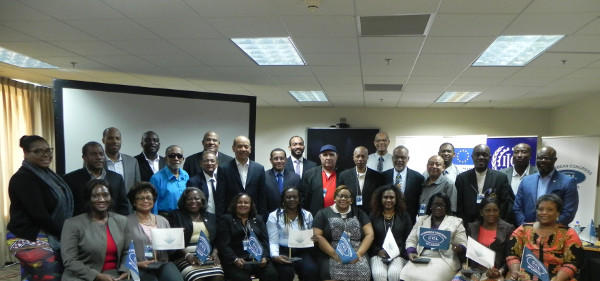 PORT-OF-SPAIN, Trinidad & Tobago:--- The 2nd Regional Bipartite Meeting of the Caribbean Employers’ Confederation (CEC) and the Caribbean Congress of Labour (CCL) took place in Port-of-Spain, Trinidad from September 26 to 29, 2017. The meeting was sponsored by the European Union (EU) and supported by the International Labour Organization (ILO).
PORT-OF-SPAIN, Trinidad & Tobago:--- The 2nd Regional Bipartite Meeting of the Caribbean Employers’ Confederation (CEC) and the Caribbean Congress of Labour (CCL) took place in Port-of-Spain, Trinidad from September 26 to 29, 2017. The meeting was sponsored by the European Union (EU) and supported by the International Labour Organization (ILO).
The Regional Meeting was an opportunity to assess progress made by the delegations along the path to stronger participation of CARIFORUM Civil Society in the Regional Development and Integration Process. This is the main objective of the EU-funded project known as “Challenges to CARIFORUM Labour, Private Sector and Employers to fulfil their EPA Obligations: Caribbean Employers’ Confederation (CEC) and the Caribbean Congress of Labour (CCL) Component of the Support to Facilitate Participation of CARIFORUM Civil Society in Regional Development and Integration Process”.
In addressing the meeting during the Opening Ceremony, Ms. Claudia Coenjaerts, Director of the ILO Decent Work Team and Caribbean Office emphasised the important responsibility on the shoulders of both the CEC and the CCL and their membership, “First, more than ever we are aware of the critical need to strengthen our regional identity in the Caribbean so that it can be a steady and legitimate force in the global context”. Furthermore, she added, “With the world of work so central to sustainable development, the place of employers and workers - and the place of tripartism in particular - is indispensable and yet questioned by some. We have both the opportunity and the urgent responsibility to demonstrate it is a strength not to be ignored, to actually demonstrate it is a necessity for economic, social and environmental sustainability.”
In his opening remarks Mr. Wayne Chen, President, Caribbean Employers’ Confederation, highlighted the value of institutional capacity which has moved from theory to reality by putting learning and experience into action. This is especially important in advocacy and lobbying for policies which advance the CEC’s agenda. “Employers and Labour have a particularly important role to play because our vision is long-term and based on feedback from our members, analysis, and empirical data. Unlike governments, we are not subject to the uncertainties of elections or the task of impressing a fickle group of voters. We have to keep our governments and constituents focused on issues that require rational, longer-term thinking and implementation”, said Chen.
President of the Caribbean Congress of Labour, Ms. Jennifer Isaacs-Dotson, expressed her hope for successful implementation of the EU-funded project and an expansion of opportunities for workers and employers. “Social dialogue is the bedrock of labour relations and forms the foundation for continued cooperation, solidarity and mobilizing members to work together.”
Ms. Monica Paul-McLean, Project Manager – External relations, Delegation of the European Union to Trinidad and Tobago commended the CEC and the CCL on their commitment to the painstaking process. She said, “This idea of social dialogue is very much in line with the European Union's policies on civil society actors in general: The EU views CSOs as a crucial component of any democratic society. Why? Because an empowered civil society represents and fosters pluralism, builds the foundation for broad-based democratic ownership of development policies and processes and can contribute to more effective, equitable, sustainable and inclusive growth.
Representatives of Workers’ and Employers’ Organizations of fifteen Caribbean countries were invited to participate in the meeting including: Antigua and Barbuda, the Bahamas, Barbados, Belize, Dominica, Dominican Republic, Grenada, Guyana, Haiti, Jamaica, Saint Kitts and Nevis, Saint Lucia, Saint Vincent and the Grenadines, Suriname, and Trinidad and Tobago However, the delegations from Haiti and Dominica did not attend due to unforeseen circumstances and the passage of hurricane Maria. As such, the meeting observed a minute of silence in solidarity with neighbouring countries impacted by recent hurricanes.
The policy positions discussed during the course of the meeting covered important themes which will be crystallized in delegates’ positions moving forward, thereby enabling them to influence the shape of policies and programmes both nationally and regionally. It is hoped that these will be self-fulfilling prophecies for being influential institutions in regional and international fora.
ILO Press Release











